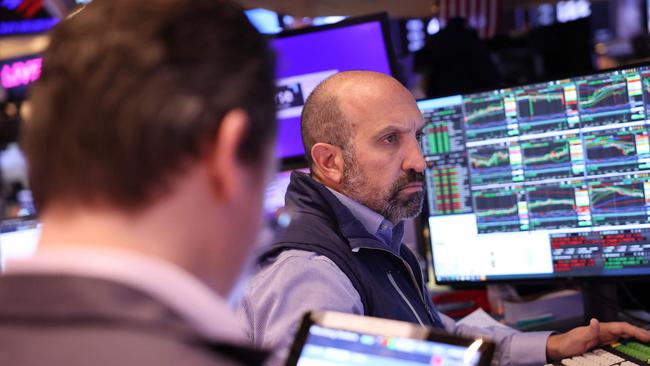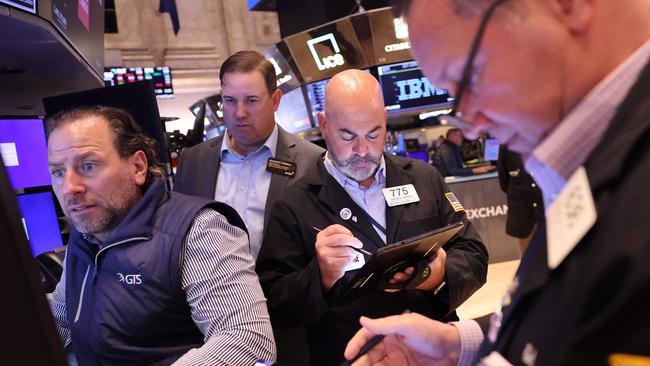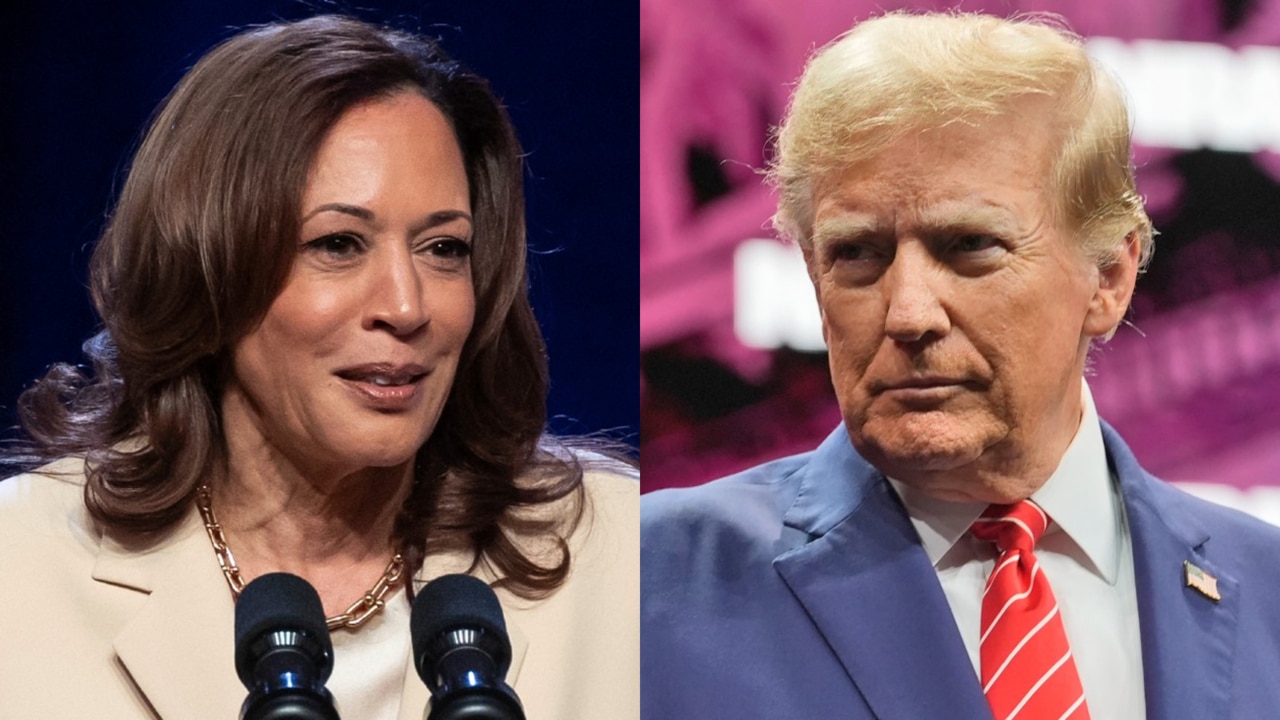JPMorgan backs US stocks as China’s fiscal stimulus looms expected
With US growth looking solid the markets are expecting a fairly aggressive easing cycle, while expectations of major fiscal stimulus in China remain high despite recent disappointment.

Business
Don't miss out on the headlines from Business. Followed categories will be added to My News.
With US growth looking solid after stronger than expected non-farm payrolls data, JP Morgan has turned more constructive on US stocks, neutralising its long defensive and short cyclicals call.
The investment bank’s confidence comes as China’s Ministry of Finance called a fiscal policy briefing for Saturday.
US inflation data this week may test the bullish narrative, but while local rate cut expectations have been dialled back after the strong jobs report, the market continues to expect a fairly aggressive US easing cycle, even as the economy continues to record solid if patchy growth.
“If so, the sluggish business cycle could more decisively shift back into recovery, as could animal spirits and inflation with upside to the procyclical trade,” JPMorgan chief market strategist Dubravko Lakos-Bujas said.
Policy support from the world’s largest economies is coming at a time of surprisingly resilient US growth with tight labour markets, ongoing government deficit spending, and record highs across equities, credit, and housing.
JPMorgan estimates that US household wealth has risen by about $US10 trillion in the past year to about $US165 trillion, or $US50 trillion since Covid-19. S&P500 earnings growth is expected to accelerate from the 3 per cent a year over the past two years, to 12 per cent a year over the next two years.
“US corporates have been increasingly focused on recycling pre-tax income into investment spending rather than returning after-tax profits to shareholders through buybacks, which is also helping to stimulate the economy,” Mr Lakos-Bujas said.
“In an all-out AI arms race, Mag-7 are accelerating investment spending to about $US500bn on capex and R&D per year.”
In his view, these drivers, along with “US exceptionalism” in areas like artificial intelligence, are offsetting an uneven and otherwise weak global macroeconomic backdrop.

Confirmation of a broader US recovery going into the holiday season will need to be seen in the weak areas like low-income consumers, private sector jobs, manufacturing and retail.
Moreover, the market has recently been backpedalling on US rate cut expectations, with the 2-year Treasury yield surging about 50 basis points in the last two weeks.
Should that continue, Mr Lakos-Bujas expects parts of the market that do better in a “higher-for-longer” interest rate environment like mega-caps, tech, long/short momentum, and quality growth sectors – that have been dormant for several months – could regain interest at the expense of both defensives and cyclicals.
“In particular, we highlight the artificial intelligence, datacentres, and electrification theme as a relative outperformer in this scenario,” Mr Lakos-Bujas said.
“In addition to these cross-currents, the US election remains a source of uncertainty for many sidelined businesses and investors, while the destabilising geopolitical backdrop remains a difficult tail-risk to time and hedge.”
Tech giant Nvidia is on the march again, having broken out from a 3.5-month consolidation pattern after rising 14 per cent in five days. Nvidia now has a shot at fresh record highs.
Bears should beware because for the past two years “as goes Nvidia, so goes the market”.
Meanwhile, some major banks continue to believe that China is about to unleash a major new fiscal stimulus, despite significant disappointment that it wasn’t announced on Tuesday.
Middle East tensions have waxed and waned this week, causing some sharp moves in oil prices, but China has captured most of the attention as hopes of major fiscal stimulus were dashed by an underwhelming press conference from the National Development and Reform Commission.

After Tuesday’s massive 9.1 per cent fall in the Hang Seng Index and intraday reversal in mainland indexes, the sell-off continued Wednesday, with the CSI 300 Shanghai Composite dropping 6 per cent until a late rebound after the MOF’s fiscal policy briefing announcement.
BofA, Citi and JP Morgan were among those who said major fiscal stimulus was imminent.
If it’s anything like the RMB4 trillion (US$586bn) stimulus package that it unleashed in 2009 and 2010 after the global financial crisis, fiscal stimulus in China could have major positive implications not just for economic growth and market valuations in China, but also the rest of the world.
After China’s top financial policymakers boosted market confidence at a September 24th briefing with a raft of stimulus measures, a press conference of China’s economic planning body right after the Golden Week holiday had fuelled expectations of rolling out new stimulus measures, yet the NDRC chair announced only incremental measures.
“In our view, the wish that the NDRC would announce a major fiscal stimulus plan at the briefing was unwarranted,” BofA’s China and Asia economist, Helen Qiao, said.
Ms Qiao said fiscal stimulus plans are more likely to come from the Ministry of Finance, and any fiscal budget revision may require the green light from the upcoming NPC Standing Committee meeting.
“The NDRC, though once nicknamed the “Little State Council”, is known for implementing policies, such as boosting the private economy or approving construction projects, rather than funding them,” she said.
“Therefore, the statement focusing on execution and implementing policies announced earlier is in line with their usual practice.”
But she saw early signs of the government trying to curb negative incentives for private businesses in the NDRC briefing, like forbidding unwarranted fines and illegal raids.
“In our view, this is a positive move towards improvement of incentives at micro levels, a challenge we identified in China’s economy, which needs to be addressed through structural adjustments.”
Ms Qiao still expects a fiscal package to be announced in coming weeks, including demand-boosting stimulus on consumption and investment, as well as further enhancement of social security, healthcare and birth encouragement.
An announcement is more likely after the next NPC Standing Committee meeting, typically held in mid to late October or early November, with the exact date likely to be announced one-to-two weeks before the meeting.
Ms Qiao thinks additional treasury issuance for 2024 is unlikely to exceed RMB2tn, and cautions that may fail to beat the market expectation “unless the latter moves down from the elevated RMB 3 – 5 trillion level”.
Citi expects fiscal easing to be announced by the month-end, and possibly the end of this week.
Citi’s global head of commodities research Max Layton said the pullback in iron ore and base metals prices in reaction to light detail on new fiscal measures on Tuesday “could provide a tactical buying opportunity, particularly for iron ore and copper” in the context of expected future easing in China.
But overall his conviction across the base metals complex was low, due to the potential for a major
More Coverage
Originally published as JPMorgan backs US stocks as China’s fiscal stimulus looms expected





